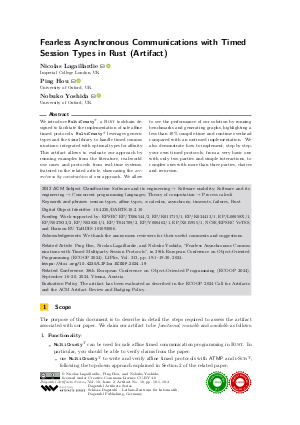Fearless Asynchronous Communications with Timed Session Types in Rust (Artifact)
Authors
Nicolas Lagaillardie  ,
Ping Hou
,
Ping Hou  ,
Nobuko Yoshida
,
Nobuko Yoshida 
-
Part of:
Issue:
Special Issue of the 38th European Conference on Object-Oriented Programming (ECOOP 2024)
Part of: Volume: DARTS, Volume 10 (ECOOP 2024)
Part of: Conference: European Conference on Object-Oriented Programming (ECOOP)
Part of: Journal: Dagstuhl Artifacts Series (DARTS) - License:
 Creative Commons Attribution 4.0 International license
Creative Commons Attribution 4.0 International license
- Publication Date: 2024-09-12
Artifact Description

PDF
DARTS.10.2.10.pdf
- Filesize: 0.65 MB
- 3 pages
Document Identifiers
Subject Classification
ACM Subject Classification
- Software and its engineering → Software usability
- Software and its engineering → Concurrent programming languages
- Theory of computation → Process calculi
Keywords
- session types
- affine types
- π-calculus
- asynchrony
- timeouts
- failures
- Rust
Metrics
- Access Statistics
-
Total Accesses (updated on a weekly basis)
0PDF Downloads0Metadata Views
Abstract
We introduce MultiCrusty^T, a Rust toolchain designed to facilitate the implementation of safe affine timed protocols. MultiCrusty^T leverages generic types and the time library to handle timed communications, integrated with optional types for affinity. This artifact allows to evaluate our approach by running examples from the literature, real-world use cases and protocols from real-time systems, featured in the related article, showcasing the correctness by construction of our approach. We allow to see the performance of our solution by running benchmarks and generating graphs, highlighting a less than 10% compile-time and runtime overhead compared with an untimed implementation. We also demonstrate how to implement, step by step, your own timed protocols, from a very basic one with only two parties and simple interactions, to complex ones with more than three parties, choices and recursion.
Cite As Get BibTex
Nicolas Lagaillardie, Ping Hou, and Nobuko Yoshida. Fearless Asynchronous Communications with Timed Session Types in Rust (Artifact). In Special Issue of the 38th European Conference on Object-Oriented Programming (ECOOP 2024). Dagstuhl Artifacts Series (DARTS), Volume 10, Issue 2, pp. 10:1-10:3, Schloss Dagstuhl – Leibniz-Zentrum für Informatik (2024)
https://doi.org/10.4230/DARTS.10.2.10
BibTex
@Article{lagaillardie_et_al:DARTS.10.2.10,
author = {Lagaillardie, Nicolas and Hou, Ping and Yoshida, Nobuko},
title = {{Fearless Asynchronous Communications with Timed Session Types in Rust (Artifact)}},
pages = {10:1--10:3},
journal = {Dagstuhl Artifacts Series},
ISBN = {978-3-95977-342-3},
ISSN = {2509-8195},
year = {2024},
volume = {10},
number = {2},
editor = {Lagaillardie, Nicolas and Hou, Ping and Yoshida, Nobuko},
publisher = {Schloss Dagstuhl -- Leibniz-Zentrum f{\"u}r Informatik},
address = {Dagstuhl, Germany},
URL = {https://drops.dagstuhl.de/entities/document/10.4230/DARTS.10.2.10},
URN = {urn:nbn:de:0030-drops-209084},
doi = {10.4230/DARTS.10.2.10},
annote = {Keywords: session types, affine types, \pi-calculus, asynchrony, timeouts, failures, Rust}
}
Author Details
Funding
Work supported by: EPSRC EP/T006544/2, EP/K011715/1, EP/K034413/1, EP/L00058X/1, EP/N027833/2, EP/N028201/1, EP/T014709/2, EP/V000462/1, EP/X015955/1, NCSS/EPSRC VeTSS, and Horizon EU TaRDIS 101093006.
Acknowledgements
We thank the anonymous reviewers for their useful comments and suggestions.
Artifact
DARTS-10-2-10-artifact-06073a8a89f4c520990f87157ca132ed.tar
(Filesize: 14.94 GB)
MD5 Sum:
06073a8a89f4c520990f87157ca132ed
(Get MD5 Sum)
Artifact Evaluation Policy
The artifact has been evaluated as described in the ECOOP 2024 Call for Artifacts and the ACM Artifact Review and Badging Policy.
Related Article
References
- Ping Hou, Nicolas Lagaillardie, and Nobuko Yoshida. Fearless asynchronous communications with timed multiparty session protocols, 2024. URL: https://arxiv.org/abs/2406.19541.
